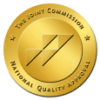Tennessee Detox Center provides a clear path to recovery for those who have served. Our veteran-focused mission is simple. Deliver safe medical care, evidence-based therapy, and steady support that respects the realities of military life.
Care is private, predictable, and built around trust. Teams understand the weight of service, the tempo of deployment, and the impact of reintegration. Every admission begins with a confidential conversation and a plan that protects your story. We coordinate only with the people you authorize.
Veterans often search for veterans’ substance abuse treatment near me because staying close to home matters. At TDC, you receive clinical excellence without losing the community and routines that keep you grounded.
From the first day, you will know who is on your team, what will happen next, and how each step supports long-term stability. Families are welcomed with consent and given practical tools to help.
When you are ready to move forward, we are prepared to meet you with respect, skill, and a plan that fits your goals.
Understanding Veterans Addiction
Veteran-focused rehab is specialized addiction treatment designed for service members and veterans who face substance use concerns and co-occurring mental health needs. It recognizes the culture of the military, the stressors tied to service, and the ways trauma and moral injury can shape behavior and health.
Care begins with a thorough evaluation and continues with coordinated support that brings together medical providers, therapists, case managers, and peer mentors. This is not a one-size model. Treatment plans are individualized and reviewed frequently to ensure progress stays on track.
Veterans’ drug rehab and veterans’ alcohol rehab include monitored detox when needed, medication management when appropriate, individual therapy, process groups, and skills practice that fits real-life stress. Family education is offered to enhance communication and establish healthy boundaries.
Community connections are established from the start, so you leave with meetings, peer support, and follow-up appointments already in place.
The result is a comprehensive pathway that stabilizes the body, calms the nervous system, strengthens coping mechanisms, and restores a sense of purpose. It is care that respects your service while providing you with the tools to recover on your own terms.
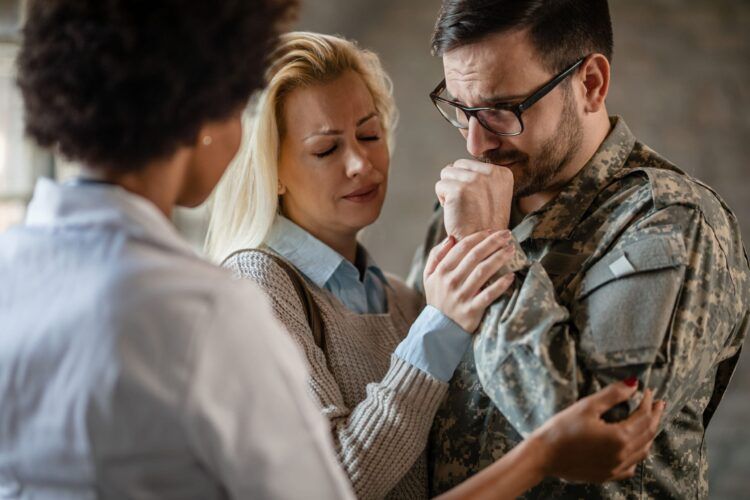
Risk Factors for Veterans Addiction
Military service can leave lasting physical and psychological impacts on the body and the nervous system. Many veterans return home carrying layers of stress from deployment, shifts in identity, moral injury, chronic pain, and disrupted sleep.
When alcohol or drugs become a fast way to blunt hyperarousal, numb intrusive memories, or manage pain, patterns can slide from coping into dependence. That is why veterans benefit from care that treats both substance use and mental health at the same time.
Common mental health concerns include PTSD, depression, anxiety, traumatic brain injury, grief, and sleep disturbance. These conditions can amplify cravings and make early recovery feel harder.
For example, poor sleep increases irritability and lowers impulse control, while chronic pain can become a trigger in its own right. Effective care teaches skills for calming the nervous system, improves sleep routines, and develops a plan for managing pain that does not compromise sobriety.
Family life is often affected as well. Partners may see mood swings, emotional withdrawal, or overreliance on alcohol during evenings or weekends. Children may sense tension without understanding why.
Education and structured family sessions help loved ones respond in ways that support healing without taking over. Clear boundaries and simple communication tools reduce conflict and keep everyone aligned with the treatment plan.
Barriers to treatment are real. Many veterans worry about privacy, career impact, or being judged for needing help. A veteran-focused program addresses these fears directly through consent-based coordination, career-safe documentation, and peers who understand the realities of service.
When veterans search for veterans’ substance abuse treatment near me, they are often looking for help that is close, practical, and respectful. Local access matters because it keeps routines intact and makes aftercare easier to maintain.
What works best is integrated, staged care.
The Importance of Veteran Addiction Treatment in Tennessee
This program serves veterans who want a complete care pathway and the clarity that comes with it. It is a strong fit for individuals managing dual diagnosis, such as PTSD, depression, anxiety, sleep disturbance, or chronic pain alongside substance use. It also serves spouses or family members who participate in education and support with the client’s consent. Early recovery clients who benefit from structure and relapse prevention find a steady footing here.
If you are returning from inpatient care and require step-down support, or if you are beginning with detox and plan to continue into outpatient services, the team will create a sequence that meets your needs. Clients who value privacy, predictable routines, and straight answers about next steps will feel at home.
If you have tried to quit on your own and keep getting pulled back by triggers, cravings, or insomnia, the combination of medical oversight, therapy, and peer accountability can change the trajectory.
Wherever you enter, you will find a respectful environment and a plan that moves at a sustainable pace.
What Happens During Veteran Rehab in Tennessee?
Medical detox stabilizes the body and protects safety. Inpatient rehab or partial hospitalization builds core skills and begins trauma work at a pace that fits the person. Intensive outpatient provides continued therapy while life responsibilities resume. Sober living can provide structure and accountability during the early stages of independence.
Throughout, dual diagnosis treatment for veterans keeps PTSD, depression, anxiety, sleep, and pain in view, so no issue is left untreated.
Evidence-based therapies are central.
Cognitive behavioral therapy helps untangle thought patterns that drive urges. Dialectical behavior therapy strengthens emotion regulation and distress tolerance. EMDR can process traumatic memories when clinically appropriate.
Motivational interviewing aligns choices with personal values and long-term goals.
Medication management may support alcohol or opioid recovery and can also address sleep, mood, or pain when indicated. This blend is the heart of PTSD and addiction treatment for veterans.
Recovery is more than stopping use. It is learning how to sleep through the night, how to ride out a surge of adrenaline without reaching for a drink, how to set limits with respect, and how to rebuild identity and purpose.
With a veteran-informed team, peer cohorts, and a clear path from detox through aftercare, progress becomes practical and measurable. The goal is to maintain steady health, foster stronger relationships, and regain confidence in roles both at home and in the community, as well as at work.
Therapies Used in Veteran Detox and Rehab Program
Care is built around a simple rhythm. You meet regularly with a primary therapist, attend small veteran groups, and participate in end-of-skills sessions that align with your goals. Medical providers coordinate medications when appropriate, and case managers remove practical barriers so you can focus on the work. Every element points toward fewer symptoms, stronger coping, and a plan that holds up on busy days.
Individual therapy that respects the service
One-on-one sessions are where you set priorities and pace. Your clinician understands military culture, moral injury, and the pull of hyperarousal. Together you map triggers, practice grounding, and build a toolkit for cravings, sleep, anger, grief, and pain. Sessions stay practical. You leave with a few skills to practice before you return.
Cognitive behavioral therapy
CBT helps you understand how thoughts, feelings, bodily cues, and actions are interconnected. You will learn to identify thinking traps, challenge them with evidence, and replace them with balanced and rational statements. We anchor CBT in real-life moments, such as a tense meeting, a family argument, or a night of poor sleep, so the skills stick.
Dialectical behavior therapy
DBT adds emotion regulation, distress tolerance, and interpersonal effectiveness. You practice short routines that calm spikes in adrenaline, scripts that keep hard conversations respectful, and plans for moments when urges climb. DBT skills are practiced in sessions and in daily life, so they become second nature.
EMDR for trauma memories
When the timing is right, EMDR can reduce the sting of traumatic memories. Preparation comes first. You will master grounding, create a safe place image, and set clear session boundaries. Processing moves at a pace you control, with frequent check-ins. The goal is relief, not overwhelm.
Motivational interviewing
Motivational interviewing helps you tap into your own reasons for change. Your therapist listens closely for what you value and what you want life to look like, then helps you line up everyday choices with those goals. It is a true back and forth, not a lecture. You stay in the driver’s seat, build confidence one step at a time, and gain momentum without feeling pushed.
Group therapy with veteran peers
Groups offer honest accountability and a place to be understood quickly. Topics include relapse patterns, shame and guilt, sleep and nightmares, anger, family strain, and rebuilding identity. You practice skills together, share what worked, and support one another through setbacks and wins.
Medication management and MAT
Medical providers coordinate medications that reduce symptoms and protect recovery. This may include non-sedating sleep strategies, mood support, and pain plans that do not undercut sobriety. Medication-assisted treatment for alcohol or opioid use can be part of the plan when clinically appropriate, always paired with therapy and skill practice. Doses and timing are regularly reviewed to help you stay steady as responsibilities return.
Sleep, pain, and TTBI-informed care
Sleep and pain are treated as core clinical issues. You will establish a repeatable wind-down routine, adjust your caffeine and light exposure, and utilize brief techniques to settle your nervous system. Pain plans may initially utilize pacing, movement, and non-pharmacological tools. If there is a history of head injury, sessions include memory aids, structured agendas, and shorter steps so progress is easier to hold.
Mindfulness and movement
Brief practices help reset the body without special equipment. You will learn breathing drills, grounding through the senses, mobility work for stiff days, and guided relaxation for nights that run hot. These are five-minute tools you can use in a truck, on a break, or before bed.
Family education and support
With your consent, family members receive clear education about addiction, PTSD, depression, and anxiety. Sessions teach communication that reduces conflict, boundary setting that promotes safety, and early warning signs that prompt action. Everyone receives a written plan to ensure the home environment supports recovery.
Skills for real-life stress
You will prepare for common pressure points before they happen. Plans cover payday routines, long commutes, shift changes, weekends, and holidays. You will write scripts for invitations to drink, create a craving plan for high-risk times of day, and establish a realistic routine for food, movement, and sleep that fits your schedule.
Peer mentorship and alumni community
Connection does not end at discharge. Veteran mentors offer check-ins, meeting suggestions, and candid advice when stress arises. Alumni groups keep you close to people who know your story and can help you course-correct fast.
Case management and practical help
Case managers align benefits, transportation, and paperwork. They coordinate with the VA or community providers when you approve it, set up first appointments, and assist with work or school documentation that protects your privacy. Removing friction keeps you focused on healing.
Spiritual care by request
If faith or spiritual practice is part of your life, we can connect you with respectful support by request. This is optional and guided by your preferences, with clinical care remaining evidence-based.
How the pieces fit together
Therapies and supports are woven into your level of care.
During detox, you receive guidance on grounding and sleep routines. In inpatient settings, you practice CBT, DBT, and early trauma work with steady medical oversight. In PHP, you add real-world exposures with daytime support.
In IOP, you apply skills learned in therapy to work, school, and family life, meeting several times a week. Sober living adds structure and accountability between sessions. Aftercare maintains a clear cadence of therapy, peer contact, and checkpoints, keeping everything connected.
What success looks like
Progress shows up in calmer nights, fewer spikes in adrenaline, quicker recovery after stress, and a plan you can follow when life is loud. You will know which tools to use, who to call, and what to do next. That combination of clinical skill, peer strength, and practical routines is the heart of veterans’ drug rehab and veterans’ alcohol rehab, and it is how a tough stretch becomes a lasting reset.
What Happens During Veterans Addiction Treatment in Tennessee?
Detox works best when it’s predictable: you know what’s happening now, what’s next, and who’s watching out for you at every turn. Here’s exactly how Tennessee Detox Center guides you from first call to your next level of care, with medical oversight, practical comforts, and clear communication.
Inpatient vs Outpatient Rehab for Veterans
Inpatient treatment provides a calm, structured environment to help you reset. Each day follows a clear rhythm, allowing you to focus on healing without distraction. Mornings begin with a brief check-in, goal setting, and a review of medication, as needed.
You will have individual therapy with a clinician who understands the unique aspects of military culture and the impact of service. Group therapy adds peer strength and real conversation about triggers, cravings, grief, anger, and hope.
With consent, family sessions help rebuild communication, clarify boundaries, and prepare loved ones to support recovery at home.
Care integrates trauma work with substance use treatment, so you are not asked to split your story in two. PTSD and addiction treatment for veterans includes grounding skills, psychoeducation about the nervous system, and paced trauma processing that respects your readiness.
Therapists use evidence-based approaches such as CBT, DBT, and EMDR where clinically appropriate. Sleep disturbance, pain, and moral injury are addressed openly, with strategies that do not undermine sobriety.
Progress is measured, not guessed. Milestones include symptom reduction, skill utilization, participation, and readiness for step-down. Clinical reviews bring your team together to adjust the plan as needed. You will practice coping tools in real-time and log what works, so those routines follow you into the next level of care. Discharge planning begins early.
Case managers coordinate authorizations, schedule follow-up appointments, and confirm housing or sober living options when necessary. You leave with a written plan that outlines therapy cadence, medication follow-up, peer supports, and emergency steps.
This is dual diagnosis treatment for veterans that treats both the mind and the body with respect for your service and a practical path toward long-term stability.
Medical Detox for Veterans
The first step is safety. In medical detox, you receive 24-hour nursing and medical oversight with frequent check-ins and calm, steady care. We use evidence-informed comfort medications when clinically indicated to reduce the risks and discomfort of alcohol, opioid, and benzodiazepine withdrawal.
Vitals are monitored, hydration and nutrition are restored, and sleep is supported, allowing your body to rest and recover. If you arrive with prescriptions, a clinician reviews them to ensure safe continuation or adjustments during the acute phase of treatment.
Detox care for veterans is trauma-informed from the moment you walk in. We ask what helps you feel safe, explain each step before it happens, and minimize lights, noise, and interruptions.
Suicide risk screening is routine and respectful, followed by a personalized safety plan that may include check-in intervals, coping tools, and consent-based contact instructions. If pain, nightmares, or hypervigilance are part of your picture, your team will address them directly and coordinate strategies that do not jeopardize recovery.
Discharge mapping begins on day one. While the medical team stabilizes your withdrawal, your case manager arranges the next level of care to ensure a seamless transition between settings.
That may mean a direct handoff to inpatient rehab, a reserved spot in partial hospitalization, or a plan that includes veteran-focused sober living.
Family updates occur only with your consent, and every plan is written in plain language so you know exactly what happens next. Detox for veterans is designed to be a concise, focused chapter that prioritizes your health and positions you for genuine progress in the stages that follow.
Partial Hospitalization Program for Veterans
Partial hospitalization serves as a bridge between inpatient care and independent living. You attend a full daytime clinical schedule and return to approved housing or home in the evening. The pace is active and focused.
Mornings include check-ins, skills groups, and goal setting. Individual therapy builds upon the work you started inpatient, while process groups reinforce accountability and problem-solving. Family sessions remain available by consent, so home routines and expectations evolve alongside treatment.
The heart of the program is skills practice in real conditions. You will apply the tools from therapy and test them during real-world stress exposures, such as errands, conversations with loved ones, and planning for work or school.
Clinicians prepare you before exposures and debrief with you afterward to track what worked and where support is needed. Relapse prevention planning is ongoing.
You will map high-risk times of day, build scripts for tough moments, and practice craving management, sleep routines, and pain strategies that support sobriety.
Medical providers oversee medications and monitor progress, adjusting as needed to keep symptoms manageable while you increase independence. Case management coordinates benefits, transportation, and community resources so practical barriers do not stall momentum.
By the end of the track, you will have a predictable week, a set of daily habits, and clear next steps into intensive outpatient care. PHP for veterans is designed to strengthen confidence while keeping clinical support close, a combination that makes the transition home safer and more successful.
Intensive Outpatient Program for Veterans
Intensive outpatient is where recovery meets real life. You come in a few times each week for a mix of one one-on-one therapy, skills practice, and small groups with other veterans. The schedule is steady but flexible, so you can keep showing up for work, school, and family.
Each week starts with a simple check-in and a plan. You set two or three goals, look at your triggers, and pick the skills you will test between sessions. Groups stay practical and honest. Veterans talk through real problems and real wins, which makes accountability feel natural instead of forced.
Therapists keep care trauma-informed and move at a pace that feels safe. You will work on cravings, sleep, emotion regulation, communication, and problem-solving under pressure. We rehearse tough conversations with a boss, a professor, or a partner and write short scripts for social events and high-stress days.
Case managers handle the logistics that trip people up. They help with benefits, paperwork, transportation, and local resources, so small barriers do not become big ones. If medication is part of your plan, a provider checks in on sleep, pain, and side effects and makes adjustments as needed. Family sessions are available with your consent, so loved ones learn how to support without taking over.
By the end of the week, you know what worked, what needs a tweak, and what you will try next. IOP for veterans is built to help you carry recovery into everyday life while staying closely connected to your team and your peers.
Veteran Focused Sober Living
Sober living offers safe, structured housing that supports early recovery while you engage in treatment. Homes follow clear expectations that make life simpler.
There are curfews, choreography rotations, and rules that help maintain a calm and predictable space. Meeting attendance is required, and random testing reinforces accountability without shaming. House meetings and peer check-ins create a steady connection so no one has to navigate tough moments alone.
The focus is on daily living done well. Staff and peer leaders provide life skills coaching that covers budgeting, meal planning, time management, and conflict resolution. Transportation support helps you get to PHP or IOP sessions, medical appointments, work interviews, and recovery meetings.
If you are transitioning from partial hospitalization, the house routine mirrors your daytime structure and provides an evening environment that supports rest and stability. If you are in intensive outpatient therapy, your home becomes a practice ground for the habits you are building in therapy.
Communication with the clinical team is consent-based and purposeful. House feedback helps your therapists adjust goals, while your therapy progress informs the level of independence you take on at home.
As you meet milestones, privileges increase and curfew eases, preparing you to transition to independent housing with confidence. Veteran-focused sober living links seamlessly with PHP and IOP, giving you a consistent routine, peer accountability, and a safe place to strengthen the skills that keep recovery steady.
Aftercare and Relapse Prevention
Recovery continues after formal treatment ends, so your team builds an individualized plan that feels usable on a busy week. You will leave with a clear therapy cadence, a named therapist, and scheduled groups or alumni meetings.
Peer support is built in through veteran cohorts, mentorship opportunities, and local meetings that match your location and schedule. A crisis plan is written in plain language, outlining early warning signs, grounding steps, and who to contact in priority order.
Medication management is coordinated with prescribers, including refill timing, side effect monitoring, and follow-up visits that fit your calendar.
Check-ins are intentional. You will have touchpoints at 72 hours, 2 weeks, and at 30, 60, and 90 days, with additional contacts if the risk rises.
Goals are measurable and anchored to real life, such as maintaining consistent sleep, attending a specific number of meetings, or completing a work or school task. Progress is reviewed and celebrated, and setbacks are viewed as data to inform adjustments to the plan.
Family members may be included with consent, so everyone knows how to support the next step. The aim is to maintain steady momentum, minimize surprises, and have quick access to help when stress levels rise.
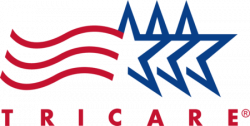
Yes, Your Insurance Covers Veteran Detox and Rehab Treatment
Tennessee Detox Center is a TRICARE rehab in Tennessee that works with TRICARE plans for substance use and mental health services. If you are looking for TRICARE alcohol rehab, our team verifies benefits quickly and explains what is covered in plain language.
Coverage may include medical detox, residential treatment, partial hospitalization, intensive outpatient care, and medication management when clinically appropriate. Copays and authorizations vary by plan, so we walk you through the details before you start.
Many veterans also use VA Community Care for rehab when services are unavailable or not timely at a VA facility. With your consent, we coordinate with the VA to confirm eligibility, submit any required documentation, and ensure that treatment plans are aligned to minimize gaps.
If you have questions about VA rehab coverage, an admissions specialist will review options, timelines, and outline the next steps. Our goal is to eliminate paperwork friction, allowing you to focus on your treatment.
Veteran Testimonials
“I was worried about privacy and my career. They only contacted people I approved and taught my family how to help without taking over.”
“Detox felt like a reset, not a punishment. The nurses kept things calm and explained every step. By the time I reached outpatient, I had a plan that made sense.”
Luis, U.S. Marine Corps, entered detox after a rough relapse. Medical staff stabilized alcohol withdrawal and set a simple sleep and nutrition routine. In inpatient, he learned grounding skills and began EMDR.
Partial hospitalization added daily skills practice and family sessions. Intensive outpatient programs fit around a new job schedule, with evening groups and medication follow-ups. Aftercare paired him with a veteran mentor and scheduled monthly check-ins. One year later, Luis still uses the same tools.
First Responders Program
Some professionals carry unique stress from the calls they answer and the choices they make under pressure. Our First Responders Program is designed for EMTs, nurses, and law enforcement personnel who require clinical care that acknowledges the unique demands of their profession.
Groups are peer-matched, so you can speak plainly without needing to overexplain the context. Confidentiality is reinforced at every step through consent-based updates and career-safe documentation.
Treatment blends trauma care and substance use treatment with practical stress management. You will learn skills for managing sleep, navigating shift transitions, and recovering from high-adrenaline states, as well as grounding techniques for addressing intrusive memories. Clinicians address moral injury and cumulative stress, while peers provide accountability that feels honest and supportive.
If you are ready to explore how this track aligns with your needs, visit the First Responders Program page for details and next steps.

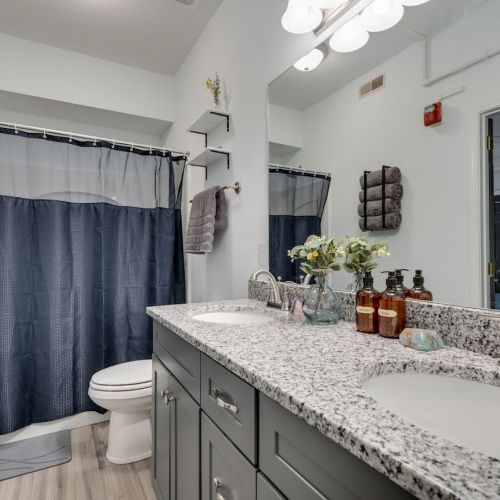






Compliance and Privacy
Your information is protected under HIPAA. We coordinate only with the people and organizations you authorize, and we limit the shared details to what is necessary for your care. You can change or revoke permissions at any time. Documentation is written in clear, career-safe language, and privacy practices are reviewed with you during intake and revisited whenever your plan changes.
Start Veterans Detox TN & VA Addiction Treatment Today
Ready to take the next step. Call Now for a confidential conversation. Verify Insurance to learn what TRICARE or VA coverage includes.
Start Admissions to schedule your assessment, which is often available on the same day, subject to capacity. Ask About Bed Availability to plan your arrival and secure a smooth transition into the right level of care.
FAQs About Veterans Detox and Rehab Programs in Tennessee
Yes. As a TRICARE rehab in Tennessee, we verify your plan, confirm authorizations, and explain copays before admission. Coverage can include medical detox, residential treatment, PHP, IOP, and medication management when clinically appropriate for veterans’ alcohol rehab and veterans’ drug rehab.
Often, yes. If services are unavailable or not provided promptly at a VA facility, VA Community Care for rehabilitation may be applicable. With your consent, we coordinate eligibility, submit necessary documentation, and align your plan with VA rehab coverage to ensure there are no gaps.
Care integrates trauma work with substance use treatment, so you are not splitting issues across programs. We utilize pacing, grounding skills, and evidence-based therapies that address service-related stress, moral injury, pain, and sleep problems. This is complete PTSD and addiction treatment for veterans.
Most detox episodes last three to seven days, depending on substance, health history, and withdrawal severity. Expect 24-hour monitoring, comfort medications as needed, and regular check-ins. Discharge mapping begins on day one, ensuring a seamless transition to the next level of care.
PHP for veterans is a full daytime schedule with clinical groups, individual sessions, and medical oversight, followed by evenings at approved housing or home. IOP for veterans meets several times a week and is designed to accommodate work, school, and family life while providing strong clinical support.
Yes, with your consent. Family sessions teach essential skills, including communication, setting boundaries, and providing practical support. We offer education modules and a clear plan outlining how loved ones can support individuals during treatment and after discharge.
Your team will reassess quickly and arrange a step up, which can include PHP or inpatient care. We coordinate authorizations and scheduling to ensure treatment continues uninterrupted.
We follow strict HIPAA standards and share information only with your written permission. Documentation is career safe, and any outreach to the VA, TRICARE, or community providers reflects your preferences for what to share and when.
Yes, with consent. We send timely summaries, medication lists, and recommendations to your chosen providers and schedule follow-up appointments. The aim is continuity of care that supports long-term recovery.
Yes. MAT options may be used for alcohol or opioid use disorders as part of a broader plan that includes therapy, skills training, and peer support. Decisions are individualized and reviewed regularly to ensure safety and effectiveness.
In many cases, yes. We match you with the most suitable program level and establish an aftercare network in your community. Staying local can strengthen routines and support systems that protect recovery.
Yes. Intensive outpatient is designed around work and class schedules. You will collaborate with your therapist to set session times, manage deadlines, and create a weekly plan that protects recovery without derailing career or education goals.
We screen for pain, sleep disturbance, and possible TBI at intake, then tailor strategies that do not undermine sobriety. Plans can include non-sedating sleep routines, physical therapy referrals, pain pacing, and cognitive supports, such as memory aids and structured agendas, to help individuals manage their symptoms effectively.
You will meet veteran mentors, join small accountability circles, and build a local meeting list before discharge. Alumni events and check-ins keep you connected, and we match you with peers who share similar service eras or family situations when possible.
In many cases, yes. Certain sessions can be delivered via secure video when clinically appropriate, especially for aftercare. We confirm eligibility with TRICARE rehab benefits in Tennessee or VA rehab coverage and ensure that technology requirements are simple and private.
Your team will map personal trigger patterns and rehearse responses. You will build scripts, craving management tools, and a stepwise plan for holidays, travel, social events, or difficult anniversaries, with a backup contact list for fast support.
Detoxification includes continuous observation and vital signs monitoring, followed by breath or urine testing when indicated in step-down care. Testing is never punitive. It informs coaching, safety planning, and level of care decisions, and results are shared only with your consent.
With your permission, we provide medication summaries, rationale, and follow-up timelines to your VA or community clinician. We clarify refills, side effect monitoring, and the next appointment date to ensure a seamless transition between programs.
We help problem-solve transportation with route planning, ride resources, and schedule adjustments. In some cases, sober living houses coordinate carpools or shuttle windows to and from programming and recovery meetings.
When participant numbers allow, we form cohorts by identity or era to increase comfort and relevance. Topics can include military sexual trauma, parenting, reintegration after deployment, and career transitions, with trauma-informed facilitation.
We establish phone access rules that strike a balance between privacy, safety, and productivity. Family contact is encouraged at structured times, and we provide coaching for difficult conversations so calls support treatment goals rather than escalating stress.
Case managers line up veteran-focused sober living or stable housing options before you step down. You will leave with addresses, contacts, and expectations, ensuring a predictable move-in process that aligns with your clinical schedule.
[1] Office of the Commissioner. (2025, September 25). FDA and Kratom. U.S. Food And Drug Administration. https://www.fda.gov/news-events/public-health-focus/fda-and-kratom
[2] Kratom. (2022, March 25). National Institute on Drug Abuse. https://nida.nih.gov/research-topics/kratom
[3] Striley, C. W., Hoeflich, C. C., Viegas, A. T., Berkowitz, L. A., Matthews, E. G., Akin, L. P., Iheanyi-Okeahialam, C., Mansoor, U., & McCurdy, C. R. (2022). Health Effects Associated With Kratom (Mitragyna speciosa) and Polysubstance Use: A Narrative Review. Substance Abuse Research and Treatment, 16. https://doi.org/10.1177/11782218221095873
[4] Striley, C. W., Hoeflich, C. C., Viegas, A. T., Berkowitz, L. A., Matthews, E. G., Akin, L. P., Iheanyi-Okeahialam, C., Mansoor, U., & McCurdy, C. R. (2022b). Health Effects Associated With Kratom (Mitragyna speciosa) and Polysubstance Use: A Narrative Review. Substance Abuse Research and Treatment, 16. https://doi.org/10.1177/11782218221095873
[5] Smith, K. E., Sharma, A., Grundmann, O., & McCurdy, C. R. (2023). Kratom alkaloids: a blueprint? ACS Chemical Neuroscience, 14(2), 195–197. https://doi.org/10.1021/acschemneuro.2c00704
[6] Becker, D. E. (2012). Basic and Clinical Pharmacology of Autonomic Drugs. Anesthesia Progress, 59(4), 159–169. https://doi.org/10.2344/0003-3006-59.4.159

Medically Reviewed By:
Dr. Vahid Osman, M.D.
Board-Certified Psychiatrist and Addictionologist
Dr. Vahid Osman is a Board-Certified Psychiatrist and Addictionologist who has extensive experience in skillfully treating patients with mental illness, chemical dependency and developmental disorders. Dr. Osman has trained in Psychiatry in France and in Austin, Texas. Read more.

Clinically Reviewed By:
Josh Sprung, L.C.S.W.
Board Certified Clinical Social Worker
Joshua Sprung serves as a Clinical Reviewer at Tennessee Detox Center, bringing a wealth of expertise to ensure exceptional patient care. Read More
The Joint Commission – The Gold Seal of Approval® signifies that Tennessee Detox Center meets or exceeds rigorous performance standards in patient care, safety, and quality. It reflects a commitment to continuous improvement and clinical excellence.
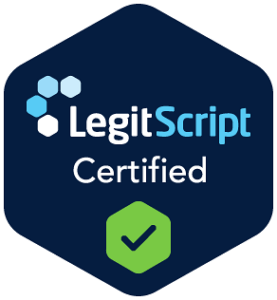
LegitScript Certified – Confirms that Tennessee Detox Center operates in full compliance with laws and regulations, and meets high standards for transparency and accountability in addiction treatment marketing.
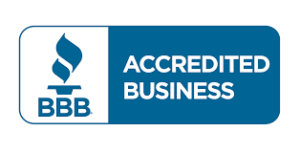
BBB Accredited – Demonstrates ethical business practices, commitment to customer satisfaction, and a trusted reputation within the community.
Psychology Today Verified – Indicates that Tennessee Detox Center is listed on Psychology Today, a trusted directory for verified mental health providers and treatment centers.
HIPAA Compliant – Ensures all patient health information (PHI) is protected and managed in accordance with strict federal privacy and data security standards.
ASAM Member – Tennessee Detox Center is a proud member of the American Society of Addiction Medicine (ASAM), reflecting a commitment to science-driven and evidence-based treatment standards.

Rutherford County Chamber of Commerce – Membership signifies active participation in the local community and support for regional growth and civic collaboration.
Get Family Support Now
Supporting Families Through Recovery
We understand addiction affects the whole family. Our comprehensive family program helps rebuild trust and restore relationships.
Weekly Family Therapy Sessions
Educational Workshops
Support Groups
Communication Skills Training


All content published on Tennessee Detox Center website pages is provided for informational purposes only and should not be interpreted as medical, psychological, or legal advice. This information is not intended to diagnose, treat, cure, or prevent any disease or condition and should not replace consultation with licensed healthcare professionals.
Addiction is a chronic, relapsing medical condition that requires individualized care. Treatment approaches, detox protocols, and rehabilitation services vary depending on numerous factors unique to each individual. No information on this website should be relied upon to make treatment decisions without professional guidance.
If you are experiencing an emergency situation, including overdose, withdrawal complications, suicidal ideation, or immediate risk to yourself or others, call 911 immediately. Tennessee Detox Center does not provide emergency medical services online or via website communication.
Never attempt to discontinue substance use or begin detox without proper medical supervision. Withdrawal can cause serious medical complications. Any information regarding detoxification is general in nature and does not substitute for physician-directed care.
Insurance information presented on this website is intended solely to assist users in understanding potential coverage options. Coverage is subject to verification, medical necessity determinations, and policy limitations. Tennessee Detox Center encourages direct contact with our admissions specialists to confirm benefits and eligibility.
We do not guarantee treatment outcomes, length of stay, insurance approvals, or placement availability. Outcomes depend on numerous clinical and personal factors.
External links are provided for convenience and informational purposes only. Tennessee Detox Center assumes no responsibility for third-party content or practices.
Use of this website does not establish a doctor-patient or therapist-patient relationship. Recovery requires professional support and individualized care.
The content available on Tennessee Detox Center pages is designed to provide educational information related to addiction, detoxification, rehabilitation, and recovery. This information should not be interpreted as professional medical advice or treatment recommendations.
Addiction treatment is highly individualized. Detox and rehab needs vary significantly based on health history, substance use patterns, and mental health considerations. Information provided is general and may not apply to all individuals.
If an emergency arises — such as overdose, severe withdrawal symptoms, or immediate danger — call 911 without delay. Online resources are not a substitute for emergency medical care.
Medical detox should always be conducted under professional supervision. Attempting detox without medical oversight can be dangerous.
Insurance information is provided as general guidance only. Coverage varies by plan and carrier. Tennessee Detox Center encourages all individuals to verify benefits directly with admissions staff.
Recovery outcomes are not guaranteed. Treatment effectiveness depends on many factors including engagement, clinical needs, and aftercare support.
References to external resources do not imply endorsement. Tennessee Detox Center is not responsible for third-party content.
Website use does not establish a provider-patient relationship.
[1] Office of the Commissioner. (2025, September 25). FDA and Kratom. U.S. Food And Drug Administration. https://www.fda.gov/news-events/public-health-focus/fda-and-kratom
[2] Kratom. (2022, March 25). National Institute on Drug Abuse. https://nida.nih.gov/research-topics/kratom
[3] Striley, C. W., Hoeflich, C. C., Viegas, A. T., Berkowitz, L. A., Matthews, E. G., Akin, L. P., Iheanyi-Okeahialam, C., Mansoor, U., & McCurdy, C. R. (2022). Health Effects Associated With Kratom (Mitragyna speciosa) and Polysubstance Use: A Narrative Review. Substance Abuse Research and Treatment, 16. https://doi.org/10.1177/11782218221095873
[4] Striley, C. W., Hoeflich, C. C., Viegas, A. T., Berkowitz, L. A., Matthews, E. G., Akin, L. P., Iheanyi-Okeahialam, C., Mansoor, U., & McCurdy, C. R. (2022b). Health Effects Associated With Kratom (Mitragyna speciosa) and Polysubstance Use: A Narrative Review. Substance Abuse Research and Treatment, 16. https://doi.org/10.1177/11782218221095873
[5] Smith, K. E., Sharma, A., Grundmann, O., & McCurdy, C. R. (2023). Kratom alkaloids: a blueprint? ACS Chemical Neuroscience, 14(2), 195–197. https://doi.org/10.1021/acschemneuro.2c00704
[6] Becker, D. E. (2012). Basic and Clinical Pharmacology of Autonomic Drugs. Anesthesia Progress, 59(4), 159–169. https://doi.org/10.2344/0003-3006-59.4.159

Medically Reviewed By:
Dr. Vahid Osman, M.D.
Board-Certified Psychiatrist and Addictionologist
Dr. Vahid Osman is a Board-Certified Psychiatrist and Addictionologist who has extensive experience in skillfully treating patients with mental illness, chemical dependency and developmental disorders. Dr. Osman has trained in Psychiatry in France and in Austin, Texas. Read more.

Clinically Reviewed By:
Josh Sprung, L.C.S.W.
Board Certified Clinical Social Worker
Joshua Sprung serves as a Clinical Reviewer at Tennessee Detox Center, bringing a wealth of expertise to ensure exceptional patient care. Read More
The Joint Commission – The Gold Seal of Approval® signifies that Tennessee Detox Center meets or exceeds rigorous performance standards in patient care, safety, and quality. It reflects a commitment to continuous improvement and clinical excellence.

LegitScript Certified – Confirms that Tennessee Detox Center operates in full compliance with laws and regulations, and meets high standards for transparency and accountability in addiction treatment marketing.

BBB Accredited – Demonstrates ethical business practices, commitment to customer satisfaction, and a trusted reputation within the community.
Psychology Today Verified – Indicates that Tennessee Detox Center is listed on Psychology Today, a trusted directory for verified mental health providers and treatment centers.
HIPAA Compliant – Ensures all patient health information (PHI) is protected and managed in accordance with strict federal privacy and data security standards.
ASAM Member – Tennessee Detox Center is a proud member of the American Society of Addiction Medicine (ASAM), reflecting a commitment to science-driven and evidence-based treatment standards.

Rutherford County Chamber of Commerce – Membership signifies active participation in the local community and support for regional growth and civic collaboration.
Holistic Detox Services
Evidence-Based Treatment
Hear directly from those who have walked the path to recovery. Our patients’ stories highlight the compassionate care, effective programs, and life-changing support they’ve experienced. Let their journeys inspire you as you take your first steps toward healing.










Thank you all so much!




















The facility itself is clean, well-maintained, and equipped with all the necessary amenities to provide a serene and supportive environment.
What truly stands out is the personalized approach to care. The team developed a treatment plan tailored to my specific needs, incorporating both medical and holistic therapies. This comprehensive approach not only addressed my physical withdrawal symptoms but also supported my mental and emotional well-being.
The counselors and therapists offer a range of therapies that helped me understand the root causes of my addiction and develop effective coping strategies. Group therapy sessions provided a safe space to share experiences and gain insights from others on similar journeys.
Overall, my experience with this medical detox program was life-changing. The compassionate and skilled staff, combined with the personalized treatment approach, provided me with the foundation I needed for a successful recovery. I highly recommend this facility to anyone seeking a safe and supportive environment for detox and recovery.
But it's the people who make this place truly special. The staff, they've been there, they understand the struggle. No judgment, just support, encouragement, and a genuine desire to help you heal. They treated me like an old friend, even though I was just visiting for my buddy.
They've got a whole range of therapies to help you on your journey – individual counseling, group sessions, and even a fitness center to get you moving again. It's not just about detox. It's about rebuilding your life from the ground up.
My friend, the owner, he's living proof that this place works. He poured his heart into creating a haven for those seeking recovery, and his passion shines through in every detail.
So, if you're ready to take that first step, this is the place. Trust me, they'll walk beside you every step of the way.


